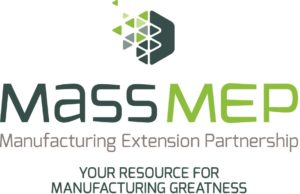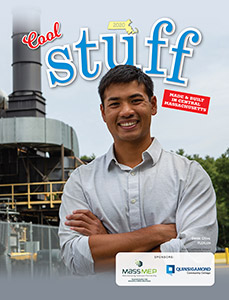Zoomers & Millennials are embracing the manufacturing and construction industries
Austin Gilman shows up for work at CIRCOR’s plant in Warren, MA and cannot wait to get in and do what he does.
“I truly love it,” said Gilman.
While still relatively new to the industry, Gilman and other Zoomers and young Millennials like him are part of an increasing wave of workers finding careers in the manufacturing and construction industries.
The hands-on submarine maker
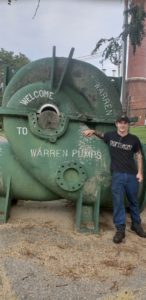
Austin Gilman enjoys seeing his work to completion.
Gilman could not see himself going to college and loved to make things and work with his hands, so he attended Pathfinder Vocational Technical High School in Palmer.
After graduation, he went to work as a machinist and continues to be passionate about his job.
“You’re taking this block of steel or aluminum or whatever you have, and you’re transforming it into a part or component to build [something] even larger,” said Gilman.
Starting out as a computer numerical control (CNC) machinist, he moved more toward the manual side of things because being a CNC was not as hands-on as he wanted. As a manual machinist, he gets to work with a material to form it into whatever part is needed.
“I love taking that block of nothing and making it into something,” said Gilman.
It’s a precise process and takes a lot of work, but he takes satisfaction out of the process and pride in his work.
For Gilman, the most satisfying part is working with a part or on a project and seeing it through completion.
“I get to say, ‘Hey, I did that, and I get to see it put together into that giant final product,’” said Gilman.
At CIRCOR, many of the parts he creates go into U.S. submarines or are parts of large pumps.
His passion bleeds into his life outside of work. Gilman owns some of his own machines and a 3D printer he uses for other projects and to freelance.
“There’s a lot of kids who haven’t even tried industry or getting into a trade,” said Gilman.
But the opportunities he has had through his industry job have led to a lot of success. He’s a homeowner with a 401(k) at 22.
“I never thought I would be in this position,” said Gilman, “All my life I’ve been told you can’t succeed in life unless you have a college degree … but there’s so many other ways.”
In the future, he looks forward to growing his skill set and moving up at CIRCOR.
“I would love to stay at what I’m doing and get better at it,” said Gilman. “In the shop we have so much going on … it’s a great atmosphere.”
All about puzzles
Derek Chhiv has worked for FLEXcon out of Spencer for six years after graduating from University of Connecticut, solving all sorts of puzzles along the way.
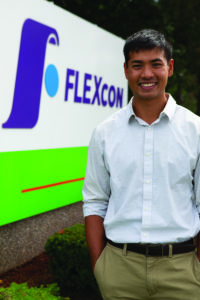
Derek Chhiv at FLEXcon likes solving puzzles.
For his first four years, he was in a product development process engineer role. When customers would come to FLEXcon and ask if it could make a product and it fit within FLEXcon’s scope and capabilities, Chhiv was one of the people responsible for developing those products.
“With my background in engineering, I am able to design, and then fabricate and test out some of these ideas,” said Chhiv, “It was a really cool position.”
He would develop the technology and run trials on machines.
Two years ago, he moved into a project engineer role in FLEXcon’s engineering department. In this role he works with machines and helped to install brand new machines from one of FLEXcon’s sister companies.
“If something breaks or if something needs to be modified, I have to figure out a way to do it,” said Chhiv.
“It’s a big puzzle,” said Chhiv, “and I find it really fun.”
He typically spends his days running around, going to machines, and designing parts.
“It’s not a typical desk job,” said Chhiv.
Even though he is working on machines and computers, there is a lot of contact with other people involved in the job as well.
“I get to interface with a lot of different people,” said Chhiv. “I’m not just put away into a corner to do my work.”
Along with his job, Chhiv is working to get his master’s degree in mechanical engineering at Worcester Polytechnic Institute. FLEXcon not only encourages Chhiv and other employees to work toward further education, but their education assistance program helps pay for the cost.
It is easy to access this program as long as the degree you’re receiving is relevant to what you do at FLEXcon, said Chhiv.
“FLEXcon has been a great company to work for,” said Chhiv, “They’re really helped me to learn and grow, and they’re going to continue to help me learn and grow.”
Fast-paced and ever changing
Everyday is different in the construction industry. Caitlin Cervello, a construction management trainee at R.H. White Construction in Auburn, loves the pace and excitement of her job.
“What I like is that everyday can be something different,” said Cervello, “Construction is ever changing and it’s fast-paced.”
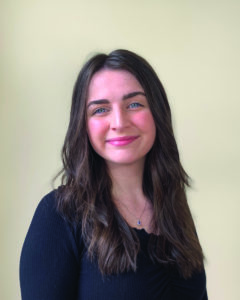
Caitlin Cervello enjoys the excitement of the construction industry.
After getting her bachelors in civil engineering from University of Hartford in 2018 and a masters of engineering this past January, she joined R.H. White’s construction management trainee program. The CMT program is a two-year rotational program with five different rotations, one in project management, site supervision, estimation, safety, and tools.
As an assistant project manager, her current role, she spends time in the office working on projects just as they’re beginning and in the field on projects already in construction.
“The most exciting part [of my job] is that you get to see these projects on paper, and then you get to see them being built, and then you get to see them complete,” said Cervello.
In the office, she is getting in touch with contractors, looking at submittals, and getting familiar with the plans and the contract. Other days, she’s in the field, looking over plans, discussing safety with crews onsite, testing equipment and training, and ensuring quality assurance and control.
Because of the rapid pace, she gets to see her day-to-day efforts add up quickly and watch projects come alive, said Cervello. It keeps things fresh that she’s not always in that same place every day, and every day she has new goals and meets new people – helping to build massive structures, buildings, or infrastructure like water treatment.
Her role includes a lot of coordination with people onsite and in the office which creates a real sense of community.
“I really enjoy working on those day-to-day activities in the field,” said Cervello. “You feel like a part of a team. And being involved on a project, making these [projects] possible.”
Some of Cervello’s work is specifically on water waste treatment facilities, a cause she is passionate about.
“The projects that I’m working on now are more geared towards water and wastewater treatment, and I think that side of it really drives me,” said Cervello.
“We often don’t think about whether your water is clean when you turn on the tap, and it’s an important job and part of society to have clean water,” said Cervello. “Working on those projects really excites me and keeps me motivated.”
Pies and problem-solving
Jenna Woodward was not quite sure exactly she wanted to do while getting her dual degree in food science and hospitality from UMass Amherst. Bumping back and forth from liking and disliking each of her majors, she realized her love of food science in her senior year.
Woodward graduated and found her way to Table Talk Pies in Worcester as a quality assurance technician. She has since been promoted to QA supervisor.
With a mix between floor and office work, her job is about ensuring everything is operating at audit standards.
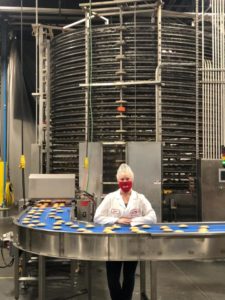
Jenna Woodward loves the problem solving of her job.
“You look for the problems and then you look for how to improve them,” said Woodward.
Woodward checks in on all the processing points in the making of the pies themselves, whether it be checking the weight of the dough, spread of the milk wash, dough’s temperatures, oven’s temperature, and more.
And then comes to processes after the pies are made. She checks on packaging and labelling, making sure boxes are going to the right customers and any flawed pies are taken off the line.
“There is a gray area with everything, but here there is really a black-and-white [standard]: This is right, and this is wrong,” said Woodward. “There is an answer, you just have to find it.”
Her job is a lot of problem solving, and she loves it.
“I love saying [when a problem arises], this is what you do and these are the steps you have to follow,” said Woodward.
Moreover, there are many different options in the manufacturing and food industries.
“In the food industry and in manufacturing, there’s a million pathways you can take and something for everyone,” said Woodward.
There’s no top or ceiling, you can keep moving up and up and in whatever direction is most interesting for you, said Woodward.
In the future, Woodward has to make the decision between moving into the food policy side of things and working for or with the U.S. Food & Drug Administration, looking at improving food manufacturing across the country, or continue on her current track in Table Talk and work up to being QA manager, really getting into the nitty gritty of what it takes to create food safely.
Around the world
Kaitlin Beach began working for Olympus Surgical Technologies America in Southborough, right out of college through a co-op position in research and development.
This role grew her interest in the physical creation of the parts, fixtures, and products her team was designing, Beach said.
“I definitely think the products are the coolest part of my job,” said Beach.
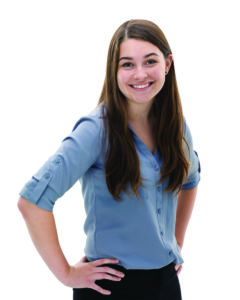
Kaitlin Beach gets to travel for her role.
The U.S. division of Olympus specializes in single-use surgical devices.
She spent a year in the position before transitioning into a 21-month leadership development program. This program took Beach around the world, from Southborough to Hamburg, Germany.
“I have had a unique introduction to manufacturing throughout my time at OSTA,” said Beach.
In Hamburg, she was part of a global exchange pilot program, seeing if there could be increased international exchange between engineers. She supported a couple of different initiatives there, including technology development research and equipment testing.
The plant in Hamburg is bigger and more established, so Beach was able to learn from their processes and bring some of this knowledge back to the U.S.
She is now back in Southborough, working full time in a manufacturing engineering group.
Travel is one of the best parts of the job, Beach said. It’s really interesting to go through different plants and see the full spread of what we do and how we do it.
Her current role works closely with production sites and suppliers to support new product development and sustaining initiatives.
“It is a good mix of different types of jobs,” said Beach.
When at production sites, she focuses on the process improvement side of things, looking at the data and to figure out what is going on with a machine and how it can be improved or fixed.
There are a lot of different roles in this industry and each one looks different, she said, and OSTA has given her lots of opportunities to grow and work in roles she otherwise would not have.
In the future, Beach said she wants to go more into Olympus’ Lean/Six Sigma group, focusing on process excellence and wanting to concentrate on improving productivity and efficiency on the factory floor.
You can really see your impact on projects through the process side of the business, said Beach.
